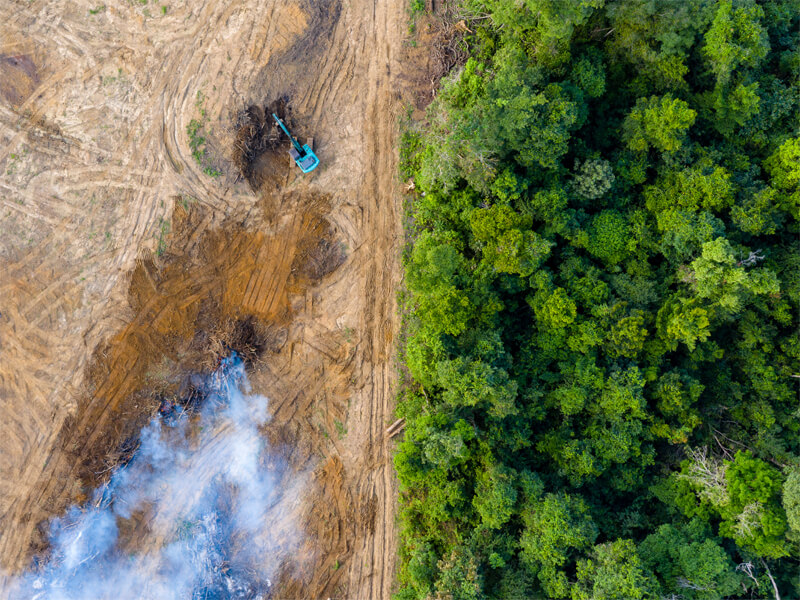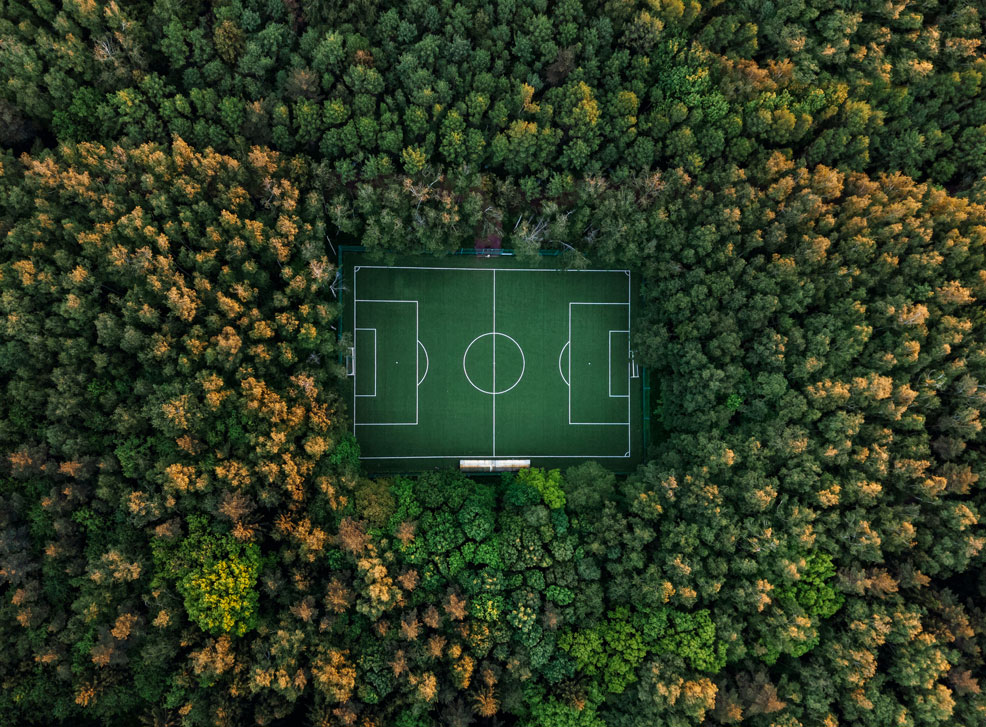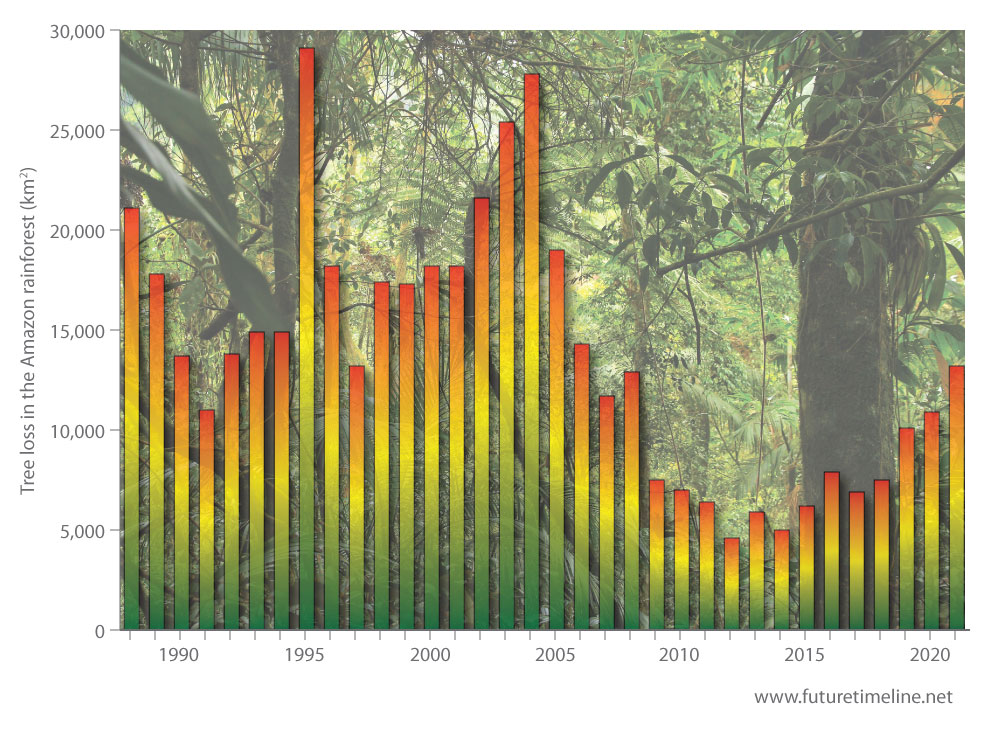
22nd November 2021 Amazon deforestation hits 15-year high Deforestation in the Amazon rainforest has reached its highest level since 2006, according to new data released by the Brazilian government.
The National Institute for Space Research (NISR), part of Brazil's Ministry of Science, Technology and Innovations, is responsible for monitoring the Amazon and has published a report showing its current status. According to the NISR, deforestation increased by 22% during the last year – from 10,851 sq km (4,190 sq mi) to 13,235 sq km (5,110 sq mi). This new data covers the 12 months from August 2020 to July 2021. The northern Brazilian state of Pará, site of Amazonia National Park, had the greatest losses at 5,257 sq km (40% of total deforestation in the country), followed by the states of Amazonas (18%) and Mato Grosso (17%). From the mid-2000s onwards, following decades of rampant deforestation, tree loss in Brazil began to undergo a dramatic slowdown. The country seemed to have turned a corner. However, after reaching a low in 2012, deforestation in the Amazon ticked up again. Since the election of Jair Bolsonaro on 1st January 2019, which soon led to a gutting of environmental protections, this trend has accelerated further. An area of rainforest the size of a football field is now being cleared in Brazil every 17 seconds. Over the span of a year, that amounts to 1,855,058 football field-sized losses.
While on tour in Dubai last week, President Bolsonaro tried to reassure investors and the public, describing criticism of Brazil's deforestation as "unfair" and claiming that the majority of the rainforest remained intact. "We want people to know the real Brazil," he said. "This is the real Brazil that the Bolsonaro government is trying to hide with fanciful speeches and greenwashing actions abroad," said Mauricio Voivodic, executive director at WWF-Brazil. "What reality shows is that the Bolsonaro government has accelerated the path of destruction in the Amazon. If we do not reverse this trend, ending deforestation, and restoring already degraded areas, the Amazon forest could reach a tipping point and start an accelerated process of degradation. If that happens, Brazil will no longer rely on the vital environmental services it provides, such as carbon storage and regulation of the country's rainfall." In fact, the rainforest may already have reached a tipping point. Home to an estimated 390 billion individual trees, the Amazon Basin has been one of the world's largest carbon sinks, absorbing 1/4 of all terrestrial land captured carbon. But in March this year, a scientific review found that overall, the region is now emitting more greenhouse gases than it absorbs. The increasing impacts of climate change and human activities – mainly wildfires, land use changes and deforestation – are causing a release of forcing agents that likely result in a net warming effect. Deforestation now accounts for almost half of all Brazilian emissions. The cattle sector, driven by international demand for beef and leather, has been responsible for about 80% of all deforestation in the region, or 14% of the world's total annual deforestation. This makes it the largest single driver of deforestation worldwide. Per capita, Brazilians are one of the world's top consumers of beef. Brazil is also a major exporter of the meat – especially to the USA and China. The latter has seen a 25% increase in demand for beef in just 10 years. At the recent COP26 summit, leaders of 141 countries – accounting for 91% of the world's forests – agreed to end deforestation by 2030, improving on a similar 2014 agreement by now including Brazil. The new declaration is non-legally binding, however. Furthermore, deforestation has actually increased since 2014, despite that earlier pledge calling for it to be halved by 2020. This does not bode well for 2030. International pressure is mounting on Brazil to improve its environmental policies. Last year, for instance, the investment arm of Nordea Asset Management – northern Europe's largest financial services group – dropped Brazilian company JBS, the world's biggest meat processor, from its portfolio. The decision came because of JBS's links to farms involved in Amazon deforestation. The issue has also negatively affected Brazil's ambitions to join the Organisation for Economic Cooperation and Development (OECD) as a permanent member. Meanwhile, several European leaders have refused to ratify a pending trade deal between the European Union and Mercosur, the South American trade bloc, unless Brazil reduces its deforestation. The Brazilian people themselves will get to decide their nation's course when the next general election is held, a little under a year from now, on 2nd October 2022.
Source: http://terrabrasilis.dpi.inpe.br
Comments »
If you enjoyed this article, please consider sharing it:
|









